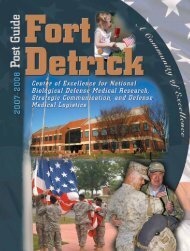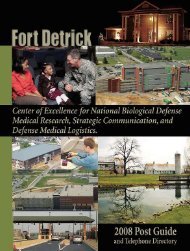About Walter Reed Army Medical Center - DCMilitary.com
About Walter Reed Army Medical Center - DCMilitary.com
About Walter Reed Army Medical Center - DCMilitary.com
Create successful ePaper yourself
Turn your PDF publications into a flip-book with our unique Google optimized e-Paper software.
document the history and practice of medicine over the centuries.<br />
The museum is in Bldg. 54 on the <strong>Walter</strong> <strong>Reed</strong> main<br />
campus and is open from 10 a.m. to 5:30 p.m. every day of the<br />
year except Dec. 25. Phone 202-782-2200 or visit its Web site<br />
at www.nmhm.washingtondc.museum.<br />
For more information about the AFIP, visit the Web site at<br />
www.afip.org, or contact the AFIP Public Affairs Office at<br />
(202) 782-2113 or 2115.<br />
Armed Forces Pest Management Board<br />
The Armed Forces Pest Management Board, or AFPMB, is<br />
a Department of Defense function under the direction of the<br />
Office of the Deputy Under Secretary of Defense for<br />
Installations and Environment. AFPMB ensures deployed<br />
<strong>com</strong>bat forces have the most effective disease vector control<br />
and pest management capabilities to prevent adverse effects on<br />
troops, weapons systems, supplies, equipment and installations,<br />
using environmentally sound techniques to reduce risk.<br />
A senior officer selected from one of the military service<br />
branches directs AFPMB; duty rotates among the services.<br />
<strong>Army</strong>, Navy, and Air Force officers and scientists staff it jointly.<br />
The AFPMB offices, located at Forest Glen, include two<br />
sections: the Directorate and the Defense Pest Management<br />
Information Analysis <strong>Center</strong>.<br />
The AFPMB Web site is www.afpmb.org.<br />
Comprehensive Breast <strong>Center</strong><br />
The <strong>Walter</strong> <strong>Reed</strong> Comprehensive Breast <strong>Center</strong>, located on<br />
Ward 55 of Heaton Pavilion, Bldg. 2 (main hospital), is an outgrowth<br />
of the Clinical Breast Care Project, a congressionally<br />
mandated military-civilian collaboration. The Breast <strong>Center</strong><br />
provides breast cancer screenings, diagnostic procedures, and<strong>com</strong>prehensive<br />
services. Broad in scope and research-centered,<br />
the Breast <strong>Center</strong> provides all patients with the opportunity to<br />
participate in clinical studies aimed at understanding the<br />
genomic (genetic) changes that occur in all breast cancers.<br />
Breast cancer patients receive treatment from all their health<br />
care providers in the center, avoiding unnecessary multiple visits<br />
and clinic appointments. The center's Risk Reduction<br />
Program specializes in identifying women who are candidates<br />
for its prevention approaches.<br />
The most modern conference and video-teleconferencing<br />
facilities in the Breast <strong>Center</strong> link its health care providers to<br />
its off-site research locations, ensuring strong collaborations<br />
between the people treating the patients and the researchers<br />
looking for new approaches in the cure for breast cancer.<br />
<strong>Center</strong> for Prostate Disease Research<br />
The <strong>Center</strong> for Prostate Disease Research Clinical Trials<br />
Research and Treatment <strong>Center</strong> at <strong>Walter</strong> <strong>Reed</strong> provides the<br />
most advanced clinical research and treatment for patients with<br />
prostate cancer and disease. This direct patient-care facility<br />
enhances the center's ability to conduct clinical research,<br />
expand its database, and continue its education and training<br />
programs.<br />
Congress established the CPDR in 1991 to help <strong>com</strong>bat the<br />
increasing rate of prostate disease. The program now manages<br />
the largest, most <strong>com</strong>prehensive prostate cancer database in the<br />
country and has made several landmark research findings that<br />
have helped to improve diagnosis and treatment in the past<br />
decade.<br />
This Department of Defense program is affiliated with the<br />
Uniformed Services University of the Health Sciences, the<br />
Armed Forces Institute of Pathology, the Henry M. Jackson<br />
Foundation for the Advancement of Military Medicine, and<br />
<strong>Army</strong>, Navy, and Air Force medical centers throughout the<br />
United States.<br />
For more information about the CPDR and its programs,<br />
visit the Web site, www.cpdr.org.<br />
Defense and Veterans Brain Injury <strong>Center</strong><br />
The Defense and Veterans Brain Injury <strong>Center</strong> is a group of<br />
seven traumatic brain injury programs in Department of<br />
Defense and Department of Veterans Affairs hospitals and a<br />
civilian TBI rehabilitation program. DVBIC sites collaborate<br />
to provide services and support to help active-duty service<br />
members, veterans and their eligible beneficiaries with TBI<br />
return to duty, work and <strong>com</strong>munity. The center provides<br />
expert case management and to ensure individualized, evidence-based<br />
treatment for each patient to maximize function<br />
and decrease or eliminate disability.<br />
Traumatic brain injury is a major cause of life-long disability<br />
and death. In earlier wars, TBI accounted for at least 14 percent<br />
of surviving <strong>com</strong>bat casualties.<br />
In addition to its headquarters at <strong>Walter</strong> <strong>Reed</strong>, DVBIC sites<br />
26 “Home of Warior Care and So Much More”
















